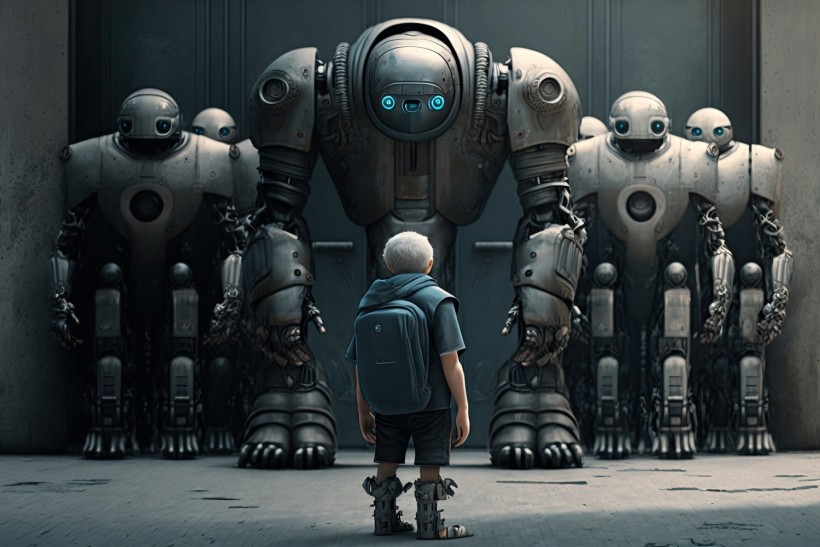If you're asking yourself whether AI will take your job, you are not alone. Since the launch of Open.ai's generative chatbot, ChatGPT, in November 2022, many have had similar concerns.
Those fears aren't necessarily unfounded: A report from Goldman Sachs says that artificial intelligence tools might replace the equivalent of 300 million full-time jobs, and take over a quarter of work tasks in the US and Europe.
That is echoed by a research paper from ChatGPT's creator Open.ai, which says that AI is likely to alter tasks within at least 80% of all jobs.
40% of working hours affected
The real answer to the question of whether AI will replace your job is that--it depends. For example, Open.ai's paper posits that at least half of peoples' tasks may be affected by AI, but it is those in jobs requiring college educations who will see the highest impacts.
Professional services company Accenture thinks that 40% of all working hours could be impacted by generative AI tools--primarily because language tasks already account for just under two thirds of the total time employees work.
In The World Economic Forum's (WEF) Future of Jobs Report 2023, jobs such as clerical or secretarial roles, including bank tellers and data entry clerks, are reported as likely to decline. Some legal roles, like paralegals and legal assistants, may also be affected, according to a recent Goldman Sachs report.
In the wider finance sector, traders, financial analysts and personal financial advisors could be impacted, because tasks such as identifying market trends, can be effectively done by AI.
Customer service jobs are also at risk as chatbots can do this efficiently. Bookkeeping or accounts roles may be replaced as software can do many of these tasks. Manufacturing will see millions more jobs replaced with smart machinery that does the same job, but faster.
New jobs en route
But this huge workplace shift is not without its advantages.
The World Economic Forum says 97 million new jobs could come into play by 2025 as humans, machines and algorithms increasingly work together. PwC says that AI's financial impact on the global economy could be more than $15 trillion by 2030.
Medicine delivery drones, coral reef restoration cleaners and robots in healthcare settings will become more prevalent in the future. Data roles, as well as jobs specifically related to the development and maintenance of AI and automation, such as prompt engineers, robotics engineers, machine managers, and AI engineers all look set to benefit too.
Those who can code in Python are in a good position, as it is key for AI development. AI trainers, and those with capabilities related to modeling, computational intelligence, machine learning, mathematics, psychology, linguistics, and neuroscience will also be in demand.
PwC estimates that AI-assisted healthcare technician jobs will see an upward surge. A sector that is already creating new jobs is automated transportation with Tesla, Uber and Google investing billions into AI-driven self-driving cars and trucks.
AI as helper
Right now, many feel that the role of current generative AI tools is less about replacing jobs, but to act as an assistant to workers, augmenting their capabilities and freeing up their time to focus on deeper work.
For example, AI tools can be used to automate tasks quickly and easily, such as summarizing reports or meeting notes. Plus they can be used for research, and can analyze data and translate text and documents.
Human-led skills are also coming to the fore, with ChatGPT itself acknowledging that, "AI is not well-suited for tasks that require complex human interactions, creativity, empathy, or critical thinking, which are areas where human workers excel".
Curate your career
If you'd like to sharpen your skills in the spirit of future-proofing your career, then the Science + Nature Job Board is a great place to start a fresh job hunt. Discover three open roles below.
VP, Systems Engineering, Fivetran, Denver
Fivetran is looking for a Vice President of Systems Engineering to manage application systems. This includes architectural strategy and design, integration, configuration and change management, ensuring that integrations with Fivetran's Automated Data Movement Platform are of the highest quality, security, and reliability. You'll need 10 years' of technical and management experience in engineering and managing systems, with five years' of proven experience in a senior technical leadership role. Get more details now.
Integration Engineer, Sensing, Tesla, Austin
Tesla is seeking a Sensor Integration Engineer to be responsible for ensuring sensor performance is successfully achieved when integrated with other subsystems in its vehicles. You'll drive the design and execution of sensing subsystems and translate sensor design discussions into design documents. To apply, you'll need a Bachelor's degree in electrical engineering, computer engineering, systems engineering, or the equivalent in experience, plus up to five years' of experience in systems design, systems architecture, and systems integration. Apply here.
Data Engineering Lead, Genentech, San Francisco
Genentech seeks a Data Engineering Lead to help to create a next generation data engine that scalably and rigorously ingests and transforms data generated, so they are ready for machine-driven analysis. You'll need a BS in a computational discipline, plus 12 years' of work experience, as well as seven years' experience architecting and developing scalable pipelines, frameworks and platforms to power data science efforts in distributed cloud environments, five of which are on AWS. See all requirements here.
Browse the Science + Nature Job Board to find your next career move
© 2024 NatureWorldNews.com All rights reserved. Do not reproduce without permission.






